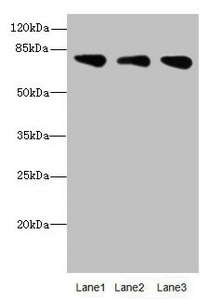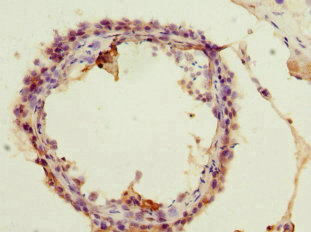-
货号:CSB-PA873629ESR2HU
-
规格:¥440
-
促销:
-
图片:
-
Western blot
All lanes: ACSS2antibody at 2.14μg/ml
Lane 1: Mouse liver tissue
Lane 2: Mouse kidney tissue
Lane 3: U87 whole cell lysate
Secondary
Goat polyclonal to rabbit IgG at 1/10000 dilution
Predicted band size: 79, 81 kDa
Observed band size: 79 kDa -
Immunohistochemistry of paraffin-embedded human testis tissue using CSB-PA873629ESR2HU at dilution of 1:100
-
-
其他:
产品详情
-
产品名称:Rabbit anti-Homo sapiens (Human) ACSS2 Polyclonal antibody
-
Uniprot No.:Q9NR19
-
基因名:ACSS2
-
别名:ACAS2 antibody; AceCS antibody; Acetate CoA ligase antibody; Acetate thiokinase antibody; Acetate--CoA ligase antibody; Acetyl CoA synthetase antibody; Acetyl Coenzyme A synthetase 2 (ADP forming) antibody; Acetyl coenzyme A synthetase cytoplasmic antibody; Acetyl-CoA synthetase antibody; Acetyl-coenzyme A synthetase antibody; ACS antibody; ACSA antibody; ACSA_HUMAN antibody; ACSS2 antibody; Acyl activating enzyme antibody; Acyl CoA synthetase short chain family member 2 antibody; Acyl-activating enzyme antibody; Acyl-CoA synthetase short-chain family member 2 antibody; Cytoplasmic acetyl coenzyme A synthetase antibody; cytoplasmic antibody; MYH7B antibody
-
宿主:Rabbit
-
反应种属:Human, Mouse
-
免疫原:Recombinant Human Acetyl-coenzyme A synthetase, cytoplasmic protein (462-701AA)
-
免疫原种属:Homo sapiens (Human)
-
标记方式:Non-conjugated
-
克隆类型:Polyclonal
-
抗体亚型:IgG
-
纯化方式:Antigen Affinity Purified
-
浓度:It differs from different batches. Please contact us to confirm it.
-
保存缓冲液:PBS with 0.02% sodium azide, 50% glycerol, pH7.3.
-
产品提供形式:Liquid
-
应用范围:ELISA, WB, IHC
-
推荐稀释比:
Application Recommended Dilution WB 1:1000-1:5000 IHC 1:20-1:200 -
Protocols:
-
储存条件:Upon receipt, store at -20°C or -80°C. Avoid repeated freeze.
-
货期:Basically, we can dispatch the products out in 1-3 working days after receiving your orders. Delivery time maybe differs from different purchasing way or location, please kindly consult your local distributors for specific delivery time.
引用文献
- Lysine β-hydroxybutyrylation promotes lipid accumulation in alcoholic liver disease N Chen,Biochemical pharmacology,2023
相关产品
靶点详情
-
功能:Catalyzes the synthesis of acetyl-CoA from short-chain fatty acids. Acetate is the preferred substrate. Can also utilize propionate with a much lower affinity.
-
基因功能参考文献:
- High ACSS2 expression is associated with renal cell carcinoma. PMID: 29503142
- A novel biologic role for ACSS2 in recycling of nuclear acetate for histone acetylation to promote lysosomal and autophagy-related gene expression and counteract nutritional stress, highlighting the importance of ACSS2 in maintaining autophagy and lysosome-mediated cellular energy homeostasis during tumor development. PMID: 28820290
- ACLY and ACSS2 are both activated to produce cytosolic Ac-CoA from glucose carbon for lipogenesis during human cytomegalovirus infection. PMID: 28167750
- ACSS2 is an important factor for promoting RCC development and is essential for cell migration and invasion, which it promotes by increasing the expression of LAMP1. PMID: 29444517
- these findings suggest that downregulation of acetyl-CoA synthetase-2 expression is a metabolic hallmark of tumor progression and aggressive behavior in colorectal carcinoma. PMID: 27713423
- Exogenous acetate augments Acss2/HIF-2 dependent cancer growth and metastasis in cell culture and mouse models PMID: 29281714
- The nuclear-cytosolic acetyl-CoA synthetase 2 recaptures acetate released from histone deacetylation for recycling by histone acetyltransferases. PMID: 28099844
- In a Honduran population, the odds of having nonsyndromic cleft lip/palate (NSCLP) among carriers of the ACSS2 variant was 4.0 with a carrier frequency of 7.1% in unrelated affected and 1.9% in unrelated unaffected individuals. In a Colombian population, the odds of having NSCLP among carriers of the ACSS2 variant was 2.6 with a carrier frequency of 10.0% in unrelated affected and 4.1% in unrelated unaffected individuals. PMID: 28543373
- In the nucleus, ACSS2 binds to transcription factor EB and translocates to lysosomal and autophagy gene promoter regions, where ACSS2 incorporates acetate generated from histone acetylation turnover to locally produce acetyl-CoA for histone H3 acetylation in these regions and promote lysosomal biogenesis, autophagy, cell survival, and brain tumorigenesis. PMID: 28552616
- ACSS2 is essential for glucose-independent acetate-mediated cell survival and tumor growth. PMID: 27539851
- Loss of ACSS2 expression is associated with with gastric cancer. PMID: 26381042
- Study revealed that the activity of acetyl-CoA synthetase 2 (ACSS2) contributes to cancer cell growth under low-oxygen and lipid-depleted conditions. PMID: 25584894
- Observations suggest that ACSS2 is expressed to a significant extent in particular tumor types, including triple-negative breast cancers. PMID: 25525877
- Study shows that ACSS2 is upregulated in the human orthotopic tumor and primary human tumors, as well as a murine glioma model; the tumors do not oxidize [U-(13)C]glutamine. In vivo oxidation of [1,2-(13)C]acetate was validated in brain tumor patients and was correlated with expression of acetyl-CoA synthetase enzyme 2, ACSS2. PMID: 25525878
- During hypoxia, ACSS2 modulates interactions of the acetylase/coactivator CBP with the stress-responsive transcription factor, HIF-2. These interactions include acetylation of HIF-2 by CBP as well as stable HIF-2/CBP complex formation, both of which are required for maximal HIF-2 signaling. Thus, ACSS2 links changes in metabolism that occur during stress with activation of a selective nuclear signaling pathway. PMID: 25108527
- Ritonavir (at 100 mg once daily and 100 mg twice daily significantly down-regulated acyl-CoA synthetase short-chain family member 2 in 20 healthy individuals. PMID: 20353815
- Because the activity of a bacterial ortholog of AceCS2, called ACS, is controlled via deacetylation by a bacterial sirtuin protein, our observation highlights the conservation of a metabolic regulatory pathway from bacteria to humans PMID: 16788062
- The patterns of (18)F-FDG and (11)C-acetate uptake seemed to complement each other in both human HCC and HCC cell lines. PMID: 19617323
显示更多
收起更多
-
亚细胞定位:Cytoplasm, cytosol.
-
蛋白家族:ATP-dependent AMP-binding enzyme family
-
数据库链接:
HGNC: 15814
OMIM: 605832
KEGG: hsa:55902
STRING: 9606.ENSP00000253382
UniGene: Hs.517034
Most popular with customers
-
YWHAB Recombinant Monoclonal Antibody
Applications: ELISA, WB, IF, FC
Species Reactivity: Human, Mouse, Rat
-
Phospho-YAP1 (S127) Recombinant Monoclonal Antibody
Applications: ELISA, WB, IHC
Species Reactivity: Human
-
-
-
-
-
-























